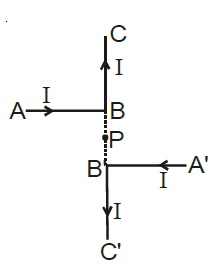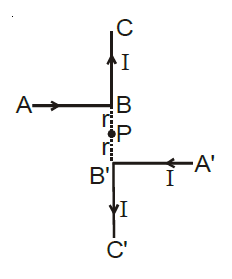Q.
Current through $ABC$ and $A'B'C'$ is $I$. What is the magnetic field at $P? BP = PB' = r$ (Here $C'B' \,PBC$ are collinear)
Solution:
Magnetic field due the portions $BC$ and $B ^{\prime} C ^{\prime}$ each is zero.
Magnetic field due to $AB$ :
$
B _{1}=\frac{\mu_{0} I }{4 \pi( PB )}\left[\sin \theta_{1}+\sin \theta_{2}\right]
$
where, $\theta_{1}=0^{\circ}$ and $\theta_{2}=90^{\circ}$
$
\begin{array}{l}
\Rightarrow B _{1}=\frac{\mu_{0} I }{4 \pi r }[0+1] \\
\Rightarrow B _{1}=\frac{\mu_{0} I }{4 \pi r } \text { (Into the paper) }
\end{array}
$
Magnetic field due to $A^{\prime} B^{\prime}$ :
$
B _{2}=\frac{\mu_{0} I }{4 \pi\left( PB ^{\prime}\right)}\left[\sin \theta_{1}^{\prime}+\sin \theta_{2}^{\prime}\right]
$
where, $\theta_{1}^{\prime}=0^{\circ}$ and $\theta_{2}^{\prime}=90^{\circ}$
$
\Rightarrow B _{2}=\frac{\mu_{0} I }{4 \pi( r }[0+1]
$
$
\Rightarrow B _{2}=\frac{\mu_{0} I }{4 \pi r } \text { (Into the paper) }
$
Thus, total magnetic field at $P , B _{ p }= B _{1}+ B _{2}=\frac{\mu_{ o }(2 I )}{4 \pi r }$ (Into the paper)
